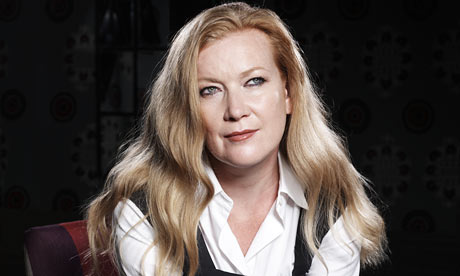Going into this film, I imagined it to be a distressing documentary on mankind’s hurt to exterminate the often-feared wasp – that behind their frightening stinger and ability to inflict pain was a soft, gentle creature yearning to live in a peaceful world where they wouldn’t have to fear flyswatters and newspapers.
Oh no. No no no. Whatever that film might have been, “Wasp” was ten times as emotionally tense and just as dire. Throughout the film, I felt as if some sudden, shocking event would arrive to scare me, ironically saving me from this stirring fear of the unknown the film was presenting me with. In a way, had a car somehow run over someone, or if those men who dropped the food turned out to be violent thugs, “Wasp” would have scared me less. “Wasp” was one big unknown because it was only a snapshot in the lives of Zoe and her kids, leaving us to fill in the blanks while watching this poor family struggle. I didn’t know anything about Zoe’s life, or how she found herself alone with four kids, and I didn’t know anything about David, and his past with Zoe. I sat there trying to piece it all together, all while this little wasp starts guest starring in the film, and I just knew it’d cause some havoc eventually. Thinking about it now, I think that’s exactly what director Andrea Arnold wanted. Your mind is buzzing around, wondering what’s possibly going on in the lives of the characters; distracting you from the actual story, just like a wasp distracts pretty much everybody from their tasks.
“Wasp” left me afraid. It left me dumbfounded. Mostly though, it made me want to find out more. Why this story? Why this one specific day in the lives of these specific characters? Why are there four children? Why the Beckham allusions? Why the wasp? Why did she get Coke and not Pepsi? (All these short films have really driven that idea of “Everything’s there for a reason,” into my head, don’t you think?) So, I did, and I think I managed to come up with a few good reasons on what makes “Wasp” belong to Arnold.

Director Andrea Arnold
Nathalie Press, who played Zoe, was practically unknown in the film community before “Wasp,” a fact that’s made me wonder if that’s the reason why I believed the film to be a documentary for the first few minutes. I didn’t feel as if I was watching an actor assume a role, but rather the character was real and true, and that Press had become Zoe. Using lesser-known actors would become a motif for Arnold, even going so far as to literally grab a woman from a train station to give her the lead role in “Fish Tank.” In the case of “Wasp,” and surely in Arnold’s other films, this decision is what drives home the realism of the story. Which brings me to my next idea…
The idea for “Wasp” had to come from somewhere, and while Arnold may think it cliche to base a film around her own life, it’s hard to believe she didn’t draw a significant influence from real life. “I grew up in a working-class family, so I guess you could say I write from what I know,” she explains. The comparisons don’t end there, with her Wikipedia page noting that she was raised as one of four children by a single mother. Is “Wasp” then, a nod to her past? Though it could be far from the actual events, there’s a chance that “Wasp” is a dramatic retelling of Arnold’s childhood; a chance for her story to be told in a medium that will reach the lives of others who may have been, or still are, in her position.
What really terrified me about the film was its paradoxical ending. We don’t know how long David will take on the role of savior for Zoe and her children, nor do we get a definiate answer on if Zoe ever grows up and escapes the cycle of poverty and fear she’s lived in. What we do get though, is a car-full of children singing along to an upbeat dance song as the camera pans out. Sure, you can draw the conclusion of a happy ending from that – which after reading more about Arnold’s films, I’ve begun to believe – but my first instinct was that the song consumed the film with its volume, growing louder until we were left with a black screen, and then credits. After sitting through twenty-six minutes of the emotional roller coaster that is “Wasp,” that song was the last thing I expected. Which is exactly why I loved the film. It was real people, real situations, real conflicts, but Arnold made it the most bizarre thing I’ve ever seen.
Photo Credit










